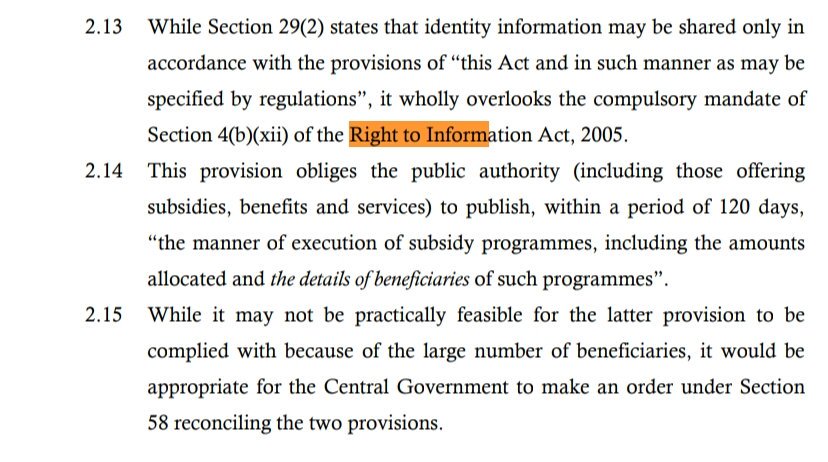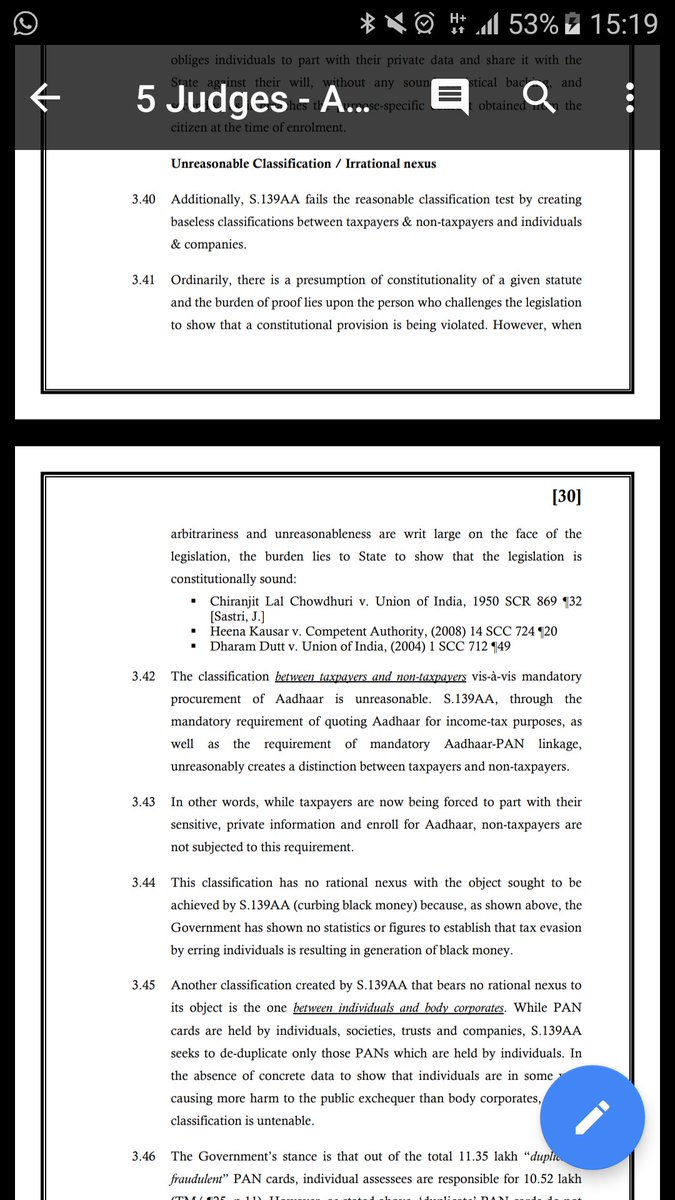- Jan: Day 1 (17/1/18)| Day 2 (18/01/18) | Day 3 (23/01/18) | Day 4 (24/1/18) | Day 5 (30/1/18)
- Feb: Day 6 (1/2/18) | Day 7 (6/2/18) | Day 8 (7/2/18) | Day 9 (8/2/18) | Day 10 (13/2/18) | Day 11 (20/2/18) | Day 12 (21/2/18) | Day 13 (22/2/18)
- Mar: Day 14 (6/3/18) | Day 15 (7/3/18) | Day 16 (13/3/18) | Day 17 (14/3/18) | Day 18 (15/3/18) | Day 19 (20/3/18) | Day 20 (21/3/18) | Day 21 (22/3/18) | Day 22 (27/3/18)
- Apr: Day 23 (3/4/18) | Day 24 (4/4/18) | Day 25 (5/4/18) | Day 26 (10/4/18) | Day 27 (11/4/18) | Day 28 (12/4/18) | Day 29 (14/4/18) | Day 30 (18/4/18) | Day 31 (19/4/18) | Day 32 (24/4/18) | Day 33 (24/4/18)
This post is essentially a compilation of tweets from Gautam Bhatia, Prasanna and SFLC to understand how the Aadhaar hearing happened in the Supreme court.
Day 34: 26 April ’18
Advocate Gopal Sankarnarayanan arguing for Centre for Civil Society, intervenor in the matter followed by Neeraj Kishan Kaul, senior advocate, appearing for AUAs and KUAs. This is followed by Advocate Zoheb Hossain for Maharashtra and UIDAI..
- Hearing will begin shortly. Advocate Gopal Sankarnarayanan will continue his submissions.
- Justice DY Chandrachud begins by interjecting Gopal Sankarnarayanan to say Aadhaar section 7 seeks to identity the beneficiaries that require subsidies. It doesn’t take away other forms of identity. As a father or a husband, of one’s citizenship etc.
- Gopal Sankarnarayanan: Aadhaar as a number who identifies me as a beneficiary of a subsidy, benefit or service. Many don’t need that identity.
- I support Aadhaar because of the safeguards and pillars on which the Act stands. But 139AA takes away those.
- Quotes Madhu Kishwar on something related to identity and is now reading Justice Kaul’s opinion in Puttaswamy.
- Aadhaar has none of the dangers. And jokingly quotes the link in Dwivedi’s profile as outed recently here on twitter about his cricker career. Jokes how no one could find if Dwivedi was a batsman or a bowler. And states he was an opening batsman.
- Chief Justice of India asks Gopal Sankarnarayanan if there is no mass surveillance through Aadhaar.
- Gopal Sankarnarayanan concurs and says there is no mass surveillance because of Aadhaar. The privacy concerns are valid. But the Act passes all the tests laid down, he states.
- Reading the statement of objects and reasons of the Aadhaar act. Says “identification of targeted beneficiaries” is key. Says Aadhaar is voluntary.
- Aadhaar Act makes Aadhaar number a pure entitlement and does not make it mandatory.
- Section 4 clearly says Aadhaar can be used as “proof of identity” for someone who doesn’t need subsidies… and does not say that it shall only be for purposes of this Act. Section 57 is therefore not really required.
- Section 5 enjoins UIDAI to take special measures for vulnerable groups. It shows there is an element of discharge of obligation by the State. Section 7 is also a beneficial provision.
- The constitution lays down that any penny from the CFI has to go to the person for whom it was earmarked. It is an onerous obligation on the state. Aadhaar attempts to ensure, with the use of biometric authentication, that this obligation is dispersed.
- Even if someone does not have Aadhaar, obligation on the state to identify, because right to identity is a 21 right, which is why Section 7 is worded in the way it is.
- Shows the enrollment form and the Disclosure provision in the end. If Aadhaar becomes the universal identity card replacing all other identity docs which were initially required to get an Aadhaar, then it is a concern.
- Says that Aadhaar identification is as secure and foolproof as one of the eighteen proof of identities taken at the time of enrollment.
- Recognition of identity of every person is an international obligation.
- Cites multiple European and US cases on right to identity. Cites a European judgment that upheld a dutch couple’s right to change the surname even though it was disallowed in the Netherlands.
- Justice DY Chandrachud asks Gopal Sankarnarayanan to counter the Petitioners’ contention that making Aadhaar as the only identification mechanism is being mandatory – section 7 is not voluntary. Someone who wants subsidies will have to have Aadhaar.
- Gopal Sankarnarayanan says Aadhaar act subserves articles 253 and 266(3) of the Constitution along with fundamental rights. Says it has to be in accordance with law. Government will have to discharge that onerous obligation to secure public funds and that is why Section 7 is reasonable.
- But the government argument on trying to argue that Section 7 is in furtherance of FRs is a flawed argument on many counts.
- Once you are already identifying beneficiaries under laws, there is no question of FRs. It is only a directive principle.
- Justice DY Chandrachud: right to nutrition.
- Gopal Sankarnarayanan: it is only a negative right in the sense, you can file a 32 petition asking Govt to not interfere with your right to nutrition…but cannot file a 32 petition asking to be fed.
- Justice DY Chandrachud: There is also a positive aspect in the sense, it confers reasonableness on State action in furtherance of such a right. It creates a judicial restraint to that extent.
- Gopal Sankarnarayanan agrees.
- Next point is his concern on Aadhaar becoming the universal idenification and all other POI documents becoming irrelevant.
- But he says allowing 18 POIs and make it available for all residents make the absolutely foolproof identification claim of the government doubtful. That needs to be had in mind in deciding proportionality. Aadhaar is also only as secure as any of the 18 POIs.
- Aadhaar Act has that balance because of the limited purpose in Section 7. But 139AA of IT Act does not have the balancing. Stresses how mandatory Aadhaar for purposes other than Section 7 is manifestly arbitrary.
- This limitation of purpose is important right at the threshold at the time of enrollment. I understand prior to the Act, the enrolments may be on problematic ground, but this Court ought to take a pragmatic view of it..given public money has been spent etc.
- The balance in Aadhaar Act …and it makes it reasonable and proportionate only if Aadhaar remains voluntary for purposes other than Section 7.
- Reiterates DPSPs and how the fundamental obligation is on the state and that gives the balance for Section 7.
- Comes to proportionality. Reads out the proportionality test followed in UK.
- Says least restrictive test does not apply because proportionality deals only with balancing. Also says embedded cards are less secure than CIDR because people could misplace the cards. So it is reasonable for any given person to choose to entrust CIDR rather than oneself.
- Security is an object of the Aadhaar Act. Safeguards, balances and limitations provided under the Aadhaar Act makes it proportional.
- However challenges Section 47 which falls foul of natural justice.
- Reiterates how Aadhaar Act is in furtherance of DPSP but not 139AA. So 139AA has to go.
- There has been hubris by authority in their security levels etc. One is not entirely sure. Even encryption level of 2048 bit assymetric key is not the best in class.
- Shows auth history of CEO UIDAI and shows how he does not trust biometrics and has locked his biometrics.
- Rakesh Dwivedi clarifies he has only been testing.
- Bench rises for lunch.
- Post-lunch hearing resumes.
- Rakesh Dwivedi objects to Gopal Sankarnarayanan arguing against 139AA given his IA not being issued notice etc.
- Bench overrules that objection.
- Gives Gopal Sankarnarayanan 20 minutes to argue.
- Gopal Sankarnarayanan says Government has to flush out the big holes in terms of security and exclusion and authentication failures before rushing everybody in.
- Mentions national informatics centre that runs both Supreme court website and UIDAI. Says SC website was hacked a few days ago.
- Says that UIDAI needs to plug the holes in the Aadhaar system before rushing with it. Says Aadhaar is not being able to keep up with technology.
- Safeguards under Aadhaar act are in addition to Section 43A and Reasonable security practices Rules under IT Act. It Rules under IT Act apply, then informed consent required when Aadhaar is used for purposes outside the Aadhaar Act. Also opt out.
- Three problems with the Act:
- 1. Section 47, 34,35 , 37, 50
- 2. section 8(4) allows sharing of identity information for the purpose of e-KYC. Says address is as equally important as biometrics. Authentication should be restricted to yes/no
- 3. Section 29(2) conflicts with section 12 of RTI Act.
- Comes next to interpretation of Section 57. Because 8 applies, informed consent is a necessary precondition therefore no question of mandatoriness in 57.
- Next challenges Section 8 (4) where “any other appropriate response sharing identity information” is provided. Says this is a privacy violation that has no counterbalancing state interest. Even address may be a private matter. Why should that be given to a KUA.
- Next argument is that Section 29 violates RTI Act.

- Next challenge is on Section 139AA on multiple grounds.
- Says that “Individual Income tax pan holders (non corporates)” are targeted by the State via Aadhaar. With respect to financial scams, the problem was dummy companies, not individuals. Yet companies are not targeted.
- For the purposes of Income tax, Aadhaar is mandatory, there’s no informed consent, and it is not related to Consolidated fund of India. Therefore proportionality test fails.
- If the aim was curbing black money and preventing money laundering, then linking pan with individual Aadhaar holders doesn’t achieve that purpose. Therefore there’s no proportionality.
- Among other points that he quickly runs through, he says the data is with the government and government has to discharge the burden of reasonableness by showing that data.

- Indian law journal: users guide to privacy says Obfuscation is a technique by which privacy can be kept intact. It gives up on trust between individual and states though. Petitioners have a valid ground of lack of trust.
- Gopal Sankarnarayanan concludes with saying how there have been a number of incidents that cause a trust deficit with the state and petitioners grounds are all valid grounds.
- Neeraj Kishan Kaul, senior advocate, begins arguments for Digital lenders association and other businesses who claim that they have built businesses around aadhaar.
- He says free flow of information necessary.
- Says if Aadhaar is a reliable, speedy tool for identification and authentication, then there’s no reason to hold it invalid.
- Cites how banking correspondents have empowered the poor. And empowered women and have helped migrant labour.
- Microfinance institutions will have a larger reach by virtue of Aadhaar and predatory financing will reduce.
- Private players are also governed by the Act. Give private players the choice to use Aadhaar if they want since section 57 is an enabling provision under the Aadhaar Act.
- Cites yolo bikes example where insurance premiums a lot lesser if there is aadhaar verification of the hirers. Insurance companies demand the same.
- Justice DY Chandrachud asks Neeraj Kishan Kaul of Section 57 and the compelling state interest or compelling public interest.
- Neeraj Kishan Kaul says he only wants Section 57 to be voluntary by consensus. For example, microfinance etc. aadhaar is critical. Through kirana shops and BCs.
- Justice DY Chandrachud asks why they need Aadhaar’s central authentication. The need for verification should not be decided by private players.
- Neeraj Kishan Kaul: Aadhaar already exists. An effective way and a cost effective way. Why should we not be entitled to use it?
- Justice Bhushan: Who is stopping you now?
- Neeraj Kishan Kaul: We want to make sure we are heard before you make observations on 57.
- The central info in Aadhaar is very minimal.
- Aadhaar very different from cambridge analytica. Statutory control.
- Says that Aadhaar is based on matching algorithms, not learning ones like Google and Facebook. No learning algorithms etc.
- The bench can make Privacy and data security regulations as stringent as possible. But as long as the private player and customer have consensus on using Aadhaar, it shouldn’t be disallowed as Aadhaar is the most effective and powerful tool for verification.
- Info that comes in ekyc is actually collectible even dehors Aadhaar. The problem is unauthorised sharing, which is a problem even outside aadhaar..no reason to strike down 57.
- Now virtual id will be even better so no KUA or AUA stores the aadhaar numbers.
- Speculative possibility of identity theft will not defeat the statute.
- Requests the bench to not exclude AUAs and KUAs from using Aadhaar for their businesses. Says that merely because there’s a scope of misuse, a statute cannot be struck down.
- Location of AUA or KUA is never shared with UIDAI. So surveillance does not arise.
- Neeraj Kishan Kaul concludes.
- Zoheb Hossain begins his brief submissions for UIDAI.
- Now thinking has developed that economic and social rights are enforceable. Cites Amartya sen capabilities approach and Martha Nassbaum.
- Socio economic rights are justiciable rights, the SC has held in the past. Article 56 of UN charter talks about inter-relation between socio economic and civil political rights.
- Cites balancing approach again. All 21 rights have to be enforced. Positive obligations of the State like food, shelter etc are embedded in Article 21.
- Canvasses a weight theory in balancing proportionality.
- In this case it is not balancing privacy and other rights…but interference with privacy with all other rights.
- Reading Maslow hierarchy of needs.
- Aadhaar is that infrastructure that helps progressively achieve positive duties of the State under article 21.
- Reading from Sandy Fredman article on positive duties emanating from economic social rights.
- Bench rises for the day.
- Hearing resumes on Wednesday, 2nd May.
- Attorney General will finish submissions that day including Money bill and Lokniti order.

